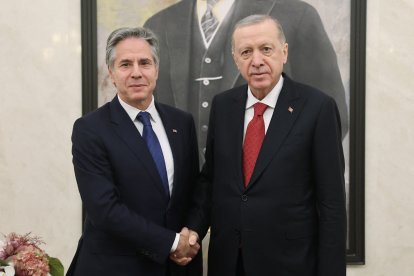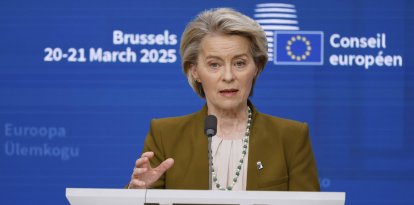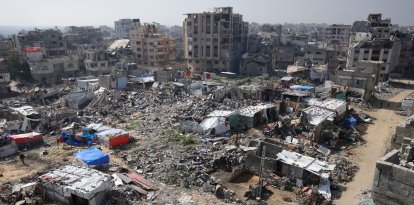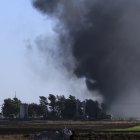Blinken visits Turkey, urges Erdogan to fight ISIS in Syria
The Turkish president, who has heavily bombed the Kurdish population in Syria and Iraq, committing possible war crimes, stated that he will not allow the fight against ISIS to weaken and offered to mediate in the conflict between the United Arab Emirates and Sudan.

Antony Blinken and Turkish President Recep Tayyip Erdogan.
U.S. Secretary of State Antony Blinken, who is on a tour of the Middle East, traveled to Turkey this Thursday to hold talks with the authorities of that country on the conflicts in the region, particularly on the situation in Syria following the fall of the Bashar al-Assad regime, and called to fight the terrorist group Islamic State (ISIS).
During his visit, Blinken held a meeting with Turkish President Recep Tayyip Erdogan in Ankara, Turkey's capital.
The Turkish government relayed in a statement that Erdogan said during the meeting that it is necessary for the international community to work toward the reconstruction of Syria.
Ankara added that it will not allow the fight against ISIS to weaken. It also noted that it will continue to fight against other organizations it considers terrorist.
Matthew Miller, spokesman for the U.S. State Department, said Blinken stressed that political transition in Syria to an accountable and inclusive government is a shared interest of Washington and Ankara.
Miller further stressed the importance of defeating ISIS.
Speaking to reporters alongside his Turkish counterpart Hakan Fidan, Blinken said he called on Turkey to urge the terrorist group Hamas to reach a ceasefire agreement with Israel.
Earlier, Blinken visited Jordan and then headed to Iraq.
US and Turkish interests in Syria
It should be noted that the United States supports the Kurdish militias, known as the Syrian Democratic Forces (SDF), while Turkey backs some of the rebel jihadist forces. Ankara is believed to have strong influence over Hayat Tahrir al-Sham, the radical Islamist group that led the offensive that resulted in the recent fall of al-Assad.
During the Syrian civil war, the SDF fought pro-Turkish jihadist forces, although both sides also fought against the al-Assad regime.
The Turks have carried out a large number of attacks against SDF positions in Syria and Iraq. These offensives increased after an attack attributed to the Kurdistan Workers' Party (PKK, for its Kurdish-language acronym) outside the headquarters of Turkey's Defense Industries in Ankara, in which five people were killed.
Turkish bombings against the Kurds
Last November, the BBC reported that massive bombings perpetrated by Turkey against the Kurdsin northeastern Syria left 1 million people residing in the region without water supplies.
The BBC added that the humanitarian situation for people in what is known as “Syrian Kurdistan” has been deteriorating due to drought, years of civil war and more than 100 attacks by Turkey from late 2019 to early 2024, which have severely damaged oil, gas and electricity facilities, significantly harming civilians.
The United Nations indicated earlier this year that these attacks could constitute a war crime.
Erdogan bombs Kurds but offers to mediate in Emirati-Sudanese conflict
While Turkey attacks the Kurds, President Erdogan offered to mediate in the tensions between United Arab Emirates and Sudan.
Sudanese authorities accuse the UAE of providing weapons to rival Rapid Support Forces militias and prolonging the internal conflict in Sudan. The Gulf country rejected the allegations and accused Khartoum of refusing to move forward on a peace deal.

World
Somalia-Etiopía: la guerra 'silenciosa' que amenaza con desequilibrar al mundo
Leandro Fleischer
The Associated Press said Erdogan made the mediation proposal during a telephone conversation with General Abdel-Fattah Burhan, Sudan's military leader, after mediating between Ethiopia and Somalia, who reached an agreement to move forward in technical negotiations to resolve a conflict that arose after the Ethiopians signed a treaty with Somaliland, a self-proclaimed republic in Somalia, to grant it an outlet to the sea.
The conflict in Sudan, which began in mid-2023, resulted in the displacement of 13 million people and a severe humanitarian crisis.
RECOMMENDATION






















